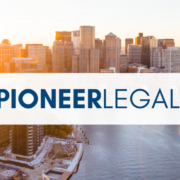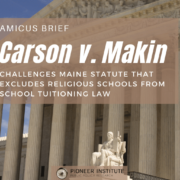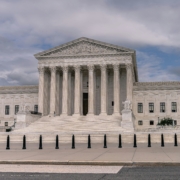New Pioneer Institute Law Center to Focus on Educational Opportunity, Economic Freedom, and Accountable Government
Retiring U.S. Bankruptcy Court Judge Frank J. Bailey to become first president of PioneerLegal
BOSTON – Pioneer Institute is pleased to announce the formation of PioneerLegal, the first non-profit, public interest law firm of its kind in New England, to defend and promote educational options, accountable government and economic opportunity across the Northeast.
“We aim to create a robust community of professionals committed to leveraging the law to advance equal opportunity and responsive, responsible government,” said Brackett Denniston, PioneerLegal’s chairman. “And we will push back on government entities when they unreasonably limit the right of individuals to grow businesses and jobs in the New England region.”
PioneerLegal’s work will be guided by three principal tenets:
- Educational opportunity is of cardinal importance in a just and merit-based society.
- Government power must be transparent, accountable and protective of the rights of citizens.
- Markets free from unwarranted intrusion and a robust business and jobs market provide the greatest opportunity for the greatest number.
PioneerLegal will achieve its mission through legal research, amicus briefs, and litigation.
PioneerLegal will also offer informational and educational programming relating to litigation, provide research on important legal issues and sponsor educational programs.
Judge Frank J. Bailey, upon his retirement later this year, will become PioneerLegal’s first president. This was made public by the United States Bankruptcy Court for the District of Massachusetts in a press release on February 15, 2022.
“The recruitment of Judge Bailey, together with the reputations of our Board members as fair-minded professionals of high character and expertise, speaks volumes about the quality of work and impact you will see from PioneerLegal,” Denniston said.
PioneerLegal is led by legal professionals of the highest reputation. In addition to Denniston, of Goodwin Procter, its Board of Directors includes:
-
-
- • Jonathan Albano, MorganLewis
- • Former Massachusetts Supreme Judicial Court Justice Robert Cordy, McDermott Will & Emery
- • R. Scott Henderson, Bank of America
- • Frank Jimenez, GE Healthcare
- • Mark Matuschak, WilmerHale
- • Lisa Rickard, U.S, Chamber of Commerce
- • Elke Trilla, Sullivan & Worcester
- • Stan Twardy, Day Pitney
-
“We are so pleased to have the opportunity to work with such high-caliber legal professionals,” stated Pioneer Institute Executive Director Jim Stergios. “This board will drive an agenda focused on upholding constitutional government, ensuring economic opportunity for all workers and entrepreneurs, and educational opportunity for all children.”
The Institute began incubating a legal initiative in 2015, with notable participation in such cases as Espinoza v. Montana Department of Revenue (U.S. Supreme Court, June 2020), Janus v. American Federation of State, County and Municipal Employees (2019) and Anderson v. Healey (2018). With the establishment of PioneerLegal as a non-partisan organization governed by legal professionals, the Institute will be able to advance strategic litigation to support its mission.
During its history, Pioneer Institute has been instrumental in establishing various social entrepreneurship organizations including the Charter Schools Resource Center, which in 2002 was spun off as Building Excellent Schools, a 501(c)(3) organization focused on training high-quality charter school entrepreneurs across the country and the Partnership for Massachusetts’ Future, a 501(c)(4) advocacy organization.
More information about PioneerLegal can be found at www.pioneerlegal.org.
A video announcement is also available.
###
Pioneer Institute is a 501(c)(3) non-profit, non-partisan research institute. Pioneer’s mission is to develop and communicate dynamic ideas that advance prosperity and a vibrant civic life in Massachusetts and beyond. Pioneer’s vision of success is a state and nation where our people can prosper and our society thrive because we enjoy world-class options in education, healthcare, transportation and economic opportunity, and where our government is limited, accountable and transparent. Pioneer values an America where our citizenry is well-educated and willing to test our beliefs based on facts and the free exchange of ideas, and committed to liberty, personal responsibility, and free enterprise.
PioneerLegal is a non-profit, non-partisan, public policy legal research and litigation entity, organized under Section 501c(3) of the Internal Revenue Code. PioneerLegal is a non-partisan, public interest law firm that defends and promotes educational options, accountable government and economic opportunity across the Northeast. Through legal action, including litigation, and public education, PioneerLegal works to preserve and enhance liberties grounded in the constitutions and civil rights laws of the United States and the individual New England states.
Get Updates




